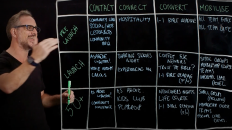I love David Allen's Getting Things Done. In it, he lists the various 'horizons' of our life (or ministry):
- Life Goals
- 3-5 Year Goals
- 1-2 Year Goals
- Areas of Responsibility
- Projects
- Next Actions.
Now it is important that we align our day to day schedule and next actions towards our higher-level goals, right? We should be using this kind of perspective to help us decide what our priorities are, what to say 'Yes' and 'No' to, what to start working on today.
But I have found, when teaching workshops on this kind of topic, that it often isn't easy or obvious to map things from higher-level goals to next actions.
- What's the next action for 'become godly'?
- What's the projects for 'visit Asia sometime before I'm 30?'
- What's the next action for 'stay fit'?
You can get there, but it's not always easy to do, especially in a workshop setting. And the risk is that you create burdensome 'demonstrable, measurable actions' that fit the alignment ideal, but just create extra work – like reporting against a grant proposal.
SO I have come up with 7 alignment principles that assist with this process, bearing in mind the quirks of the different horizons:
- Do an integrity idiot check: do my life goals/values clash with any of my goals, roles, projects, and next actions?
- What resolutions or habits will help me towards my life goals? Life goals, and often 3-5 year goals, are not always things that you can break down into linear steps. They are more intangible and vibey. Or so far away that the next actions seem forced. So perhaps better to think of resolutions to pray and seek accountability on. Or some weekly (or monthly or annual) habits that will keep you ticking away at it. For example if my 5 year goal is to be a writer, then 'write every day' is a habit.
- What am I doing this week that is relevant to my 1-2 and 3-5 year goals? That can be a helpful check. It's not always relevant or obvious, but it can be. Am I praying about it? Reading something? Getting advice? Learning something new? Doing a baby step towards it?
- Are there 1-2 year goals that are baby steps towards my 3-5 year goals? Not all 3-5 year goals have obvious intermediate goals, especially if I want to 'get to it later' rather than 'start work on it tomorrow' – for e.g. 'learn Chinese' is a 5 year goal, but it has been deliberately put 'on ice' for now. But others clearly do have intermediate goals. If I want to 'climb Everest' in 5 years, then getting fit and saving money are two shorter term goals.
- Do my areas of responsibilities all have both goals and projects? Areas of responsibility really are the big gateway between day to day actions and big picture goals. So for each of the roles in my life, what am I aiming for? And what am I working on specifically? Am I dead in the water with any of my roles in life?
- What different areas of responsibility have my goals given me? A single 1-2 year goal may generate multiple 'hats'. For example, if I want to start a new business, I will have a range of different roles – from business planner, to investor engagement, to marketer.
- Am I moving all my projects forward? What is the next action I need to be doing to remove the inertia around this project I'm working on right now?



